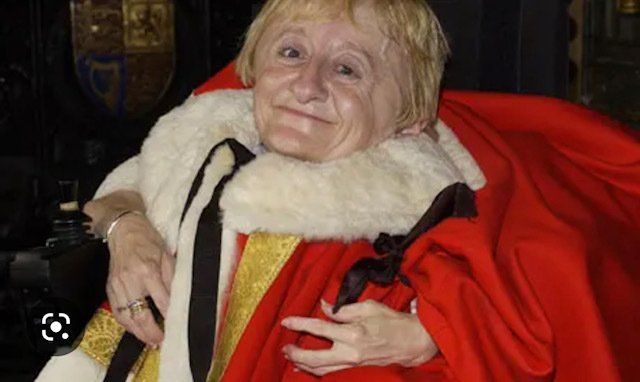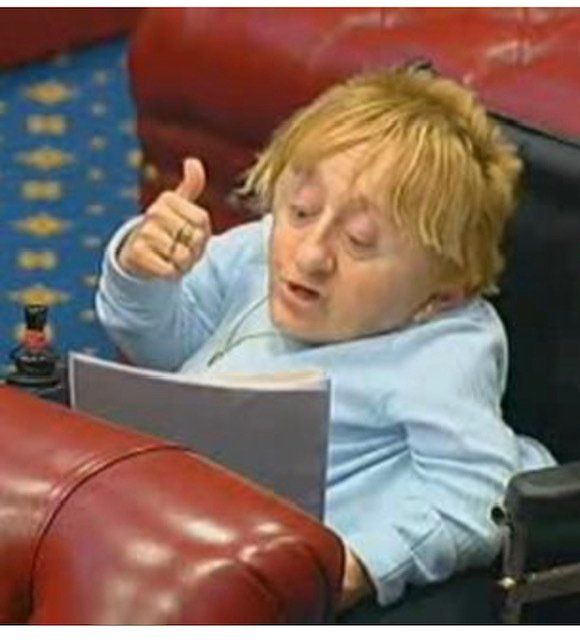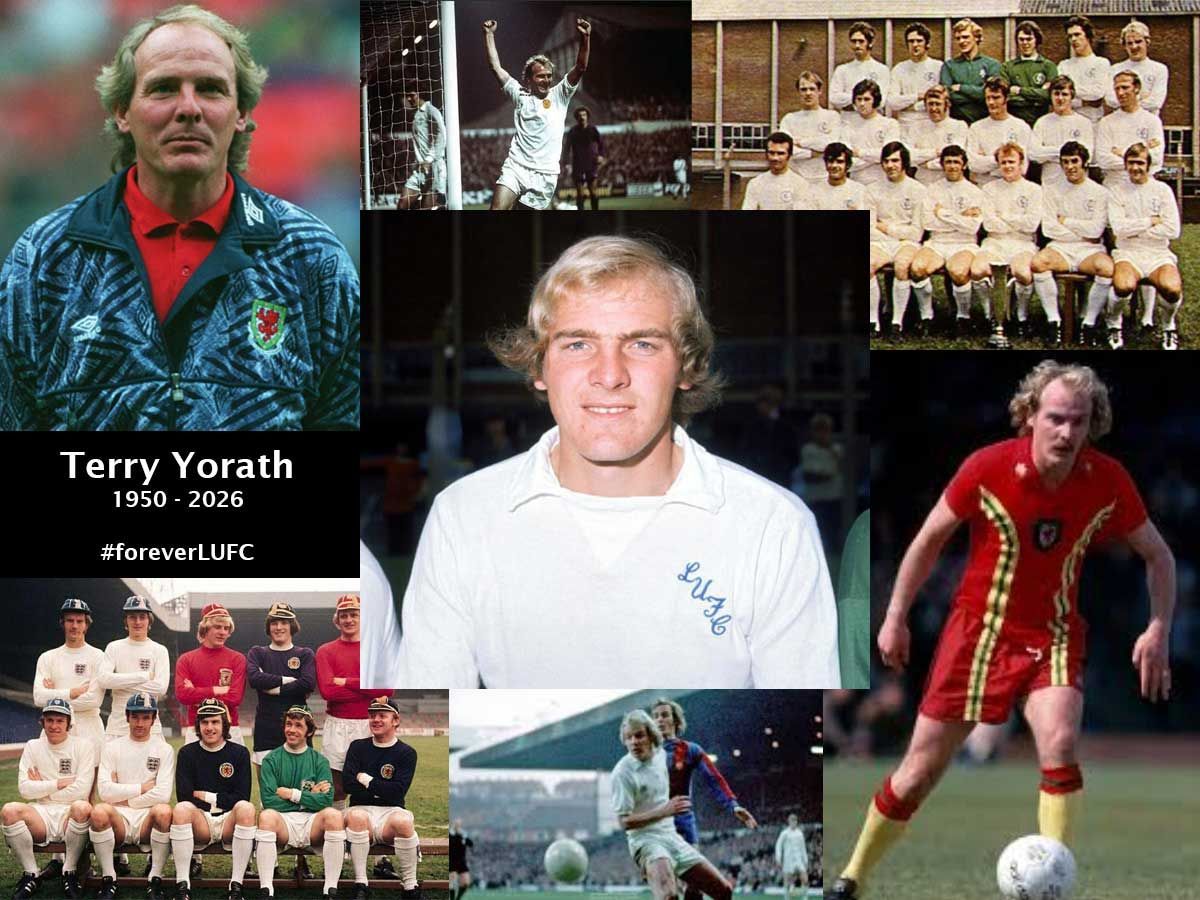This was the sign that greeted visitors to the home of Baroness Chapman of Leeds.

It shows the wicked sense of humour of the first peer to attend the House of Lords with a congenital disability, both of which she used to great effect for the causes she believed in.
She was more than a campaigner; she was a fighter.
As an ardent Leeds United supporter, she became a member of Leeds United Disabled Organisation (LUDO) in 1994, two years after its formation, and was Chair from 1998 to her death in 2009. She was a formidable advocate for disabled supporters, often leaving the normally belligerent Ken Bates speechless, and in agreement.
A redoubtable adversary who converted the parsimonious Ken Bates into a financial supporter of LUDO and disabled rights
.
Shaun Harvey, former CEO of Leeds United, commented,
‘She was inspirational, she was a fighter, she was a character, and she was devoted to everything she believed in’
Leeds United disabled supporters benefited from her selfless work in making the ground more accessible with improved disabled facilities. In an interview with the Independent in 2005 she described her love for Leeds United.
‘I have always been a passionate Leeds United Supporter. I’m a Leeds girl. I’ve only missed 2 Leeds home games in five years, both due to illness. I go to as many Leeds away games as possible’, Mike Donnelly in the Guardian observed.
‘Sitting just 2ft 9 inches in her wheelchair, Nicky Chapman was a challenge to anybody on first meeting. Her distinctive body size and shape could not- and as she always said, should not be ignored. From her small frame she held you with a steady gaze, ready and disarming laugh. She was the outspoken champion of difference that she quite literally embodied’
‘She made us stretch towards a higher understanding of what it means to be different’
In a very profound and nuanced way, she shook people’s perceptions of normality and what it meant to be different.
A current Leeds United official described how she would overcome club objections to her proposals with her humour and physicality, describing herself as ‘a head in a wheelchair’. Her dedication and commitment to advance the cause of the disabled Leeds United supporter met with great success. She was a dynamo of persuasion.
An organisation that provides thousands of accessible homes in the UK, Habinteg, their current website, even 13 years after Nicky's death confirms her ability.
‘Nicky’s physical presence was as hard to ignore as her outspoken views. Nicky openly used her body image to her advantage in her work, challenging perceptions about difference and fighting for equality. With her naturally persuasive wit and passion Nicky championed social inclusion, accessible design, independent living and services that suit people whatever their needs’.
In 2004 she was appointed one of the first ‘People Peers’ and took her campaigning to the House of Lords. Nicky said on her appointment
‘They don’t know what they are doing’. The Leeds United website commented,
‘it is clear with an iron will, Nicky will fight tooth and nail for social justice’.
People peers were nominated because of their record of significant achievement, integrity and independence. Not affiliated to any political party she sat as a cross bencher. Her maiden speech created a stir on the red benches. That colour has ironically been described as epitomising stopping legislation. The Lords, however, was soon to realise that Baroness Chapman was in no mood for prevarication.
Lord Bassam of Brighton said, ‘she told me in no uncertain terms she wanted to make sure something was done'.
Her maiden speech on the Mental Capacity Bill was described as ‘excellent and moving’ ‘powerful and personal’ ’remarkable and moving’ ‘an extraordinarily powerful maiden speech’. She certainly woke up the sleeping beauties.
And no apology is needed for reproducing it in full here from Hansard;
‘I am a Yorkshire lass, born and brought up in Leeds. My background is very different to that of most people in this House. My education began at home, tutored by my parents, and later supported by a tutor provided by the local education authority for three years a week. When I was 8, I entered segregated education, then mainstream further education college and then University. That was followed by unemployment. While out of work, I volunteered as an IT Tutor at a centre working to rehabilitate young offenders.
That soon developed into an almost full-time voluntary post, as I also helped with job applications and benefit claim forms, taught some numeracy and literacy skills and worked on social skills in given situations.
It was with regret that I left after seven months to take up full time employment in a clerical post with my local council. Over the next few years, I worked my way up within the council until I attained a tutoring position in an adult education centre. I worked at different projects with a variety of people from a broad spectrum of the community, and I continued to enjoy teaching for several years.
I had to give up full time employment about 12 years ago due to several leg fractures, which failed to heal. From there, I began acting as an advocate for people who felt unable to deal with issues themselves. This led me to voluntary working with Habinteg Housing Association, Leeds Centre for Integrated Living, and Leeds United Association Football Club. I became more involved in disability rights, particularly focusing on independent living issues and the right to access work and leisure facilities including sports stadiums.
As I gained more knowledge and experience, I was asked to join committees at local, regional, and national levels to promote social inclusivity and disability equality.
Without descending into the realms of controversy, I have to say that I have grave concerns about the Bill. People are born and they die: those are the only two certainties in life. I have no doubt about the good intentions around the introduction of the Bill, but we must not lose the basic premise of a right to live in order to allow people the right to die.
Although I can accept some of the arguments for sections of the Bill, it is virtually impossible for legislation to allow such measures in a way that is not open to the abuse of a licence to kill.
Assessment of best interest and burdensome should not be medical model based and should not focus only on the negative aspects of a person’s condition. A situation that appears intolerable to people who are fit and well may be more than outweighed by the positive experiences of the patient. They have family and friend’s relationships that are part of them being a rounded individual and not simply a condition or impairment. There is a clear line between increasing pain-control medication that may hasten death and withdrawing support that causes death.
That line is the quality of life of the patient, however little life remains.
I feel at this point I should declare an interest. If the Bill had been passed 43 years ago, I would not be here. My parents were told I would be blind, deaf, unable to communicate and have no noticeable mental function.
Doctors and practitioners do get it wrong.
We need to ensure that people have the opportunity to prove the medics wrong.
Although protected from the Bill as a child there would have been two or three occasions after childhood, where, from a purely medical perspective, treatment could have been withdrawn from me. The Bill ignores the fact that people have the basic right to live: that issue cannot and must be ignored.
As I feel I am beginning to cross the line into controversy, I will end by saying- I hope the noble Lords agree- that our first duty to the people of this land is to keep them safe. The less able and more dependent they are the greater the duty. As it stands the Bill does not keep people safe’.
Little did the nine taxi drivers who drove past her outside the House of Lords refusing to pick her up, realise what they had unleashed. After 13 years since the Act was passed, Nicky Chapman ensured that S36 of the Disability Discrimination Act was enforced and significantly altered the Local Transport Act 2008 benefiting 1.2 million wheelchair users.
Lord Hanningfield commended her ‘tireless work on this matter, and we all want to commend her for that’.
She was not a fan of political correctness. She preferred people who get sincere and honest words wrong to those who use the right words and stab you in the back.
She demonstrated this with her naming her disabled cat ‘Crip’.
Asked by the Independent what made her laugh she said that her brother on the day of her appointment as a Peer said that she looked like something that had escaped from Santa’s sack dressed in her crimson robe edged in miniver.

During her life she suffered 600 fractures due to her brittle bone disease, but continued to give talks laced with her unique sense of humour to schools, health groups and in fact anybody who would listen, to raise awareness of disability.
She was an inspiration to so many. Susan Morrell for one, who said, ‘for me as a disabled women everything she did was as a disabled woman and that personal experience of oppression and disabling barriers'.
Nicky died on 3rd September 2009.
Leeds United named a suite after her to recognise her work with LUDO, the only supporter ever to receive such an accolade amongst a pantheon of legendary Leeds United players. The players wore black armbands in tribute to her in the game against Stockport County. In these Corporate days it is unlikely that such an honour will be bestowed on any supporter again despite their achievements. It is hoped that her name and work will still be recognised if the West Stand redevelopment takes place and not replaced with a tribute to the Yankee Dollar.
Diane Forth, then Secretary of LUDO, said, ‘She was a very special lady. Very determined. Nothing was too much trouble for Nicky. She would do anything for anybody’.
The CEO of Habinteg commented, ‘We have lost a great champion of difference, a figurehead, a fighter. Nicky lived her life battling for the right to be respected and included’.
Tributes were paid throughout the world.
The Sydney Herald put it simply, ‘a selfless heart that stood up for the disabled’.







